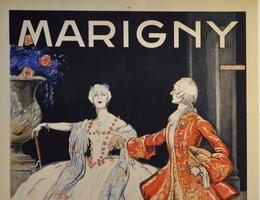Monsieur Beaucaire
OA Romantic operetta in a prologue and 3 acts, premièred on 7 April 1919 at the Prince of Wales Theatre, Birmingham, UK. Based on the eponymous novel by Booth Tarkington (1900). French première: 21 November 1925 at the Théâtre Marigny in Paris; adapted by André Rivoire and Pierre Veber.
Messager, having been musical director at Covent Garden from 1901 to 1907, had established a special bond with England. Thus, after the First World War, he was the ideal person to create a work in celebration of Franco-British friendship. The operetta is set in Bath in the eighteenth century. While posing as a barber, Monsieur Beaucaire hosts a busy gambling den. When he catches the Duke of Winterset cheating, he agrees to say nothing on condition that Winterset introduce him to Lady Mary Carlisle, with whom he is in love. Presented to the young woman as the Duke de Châteaurien, Beaucaire wins her heart. Jealous, Winterset exposes the deception. But the French Ambassador rehabilitates Beaucaire by revealing his true identity as the Duke of Orléans, cousin of King Louis XVI of France. To everyone’s delight, “Beaucaire” announces that Lady Mary is to be his Duchess. Messager began work on Monsieur Beaucaire following a meeting with impresario Gilbert Miller in 1916. The score, completed in the summer of 1917 in Étretat, is one of his most accomplished works. Despite its being a Franco-English production, Messager expressed in it his affection for Wagner, with harmonies reminiscent of Lohengrin. The première in Birmingham was a triumph, with the orchestration unanimously acclaimed by the critics. The French première took place six years later at the Théâtre Marigny in Paris, where it had a run of over two hundred performances. In 1954 it made its long-awaited entry into the repertoire of the Opéra-Comique, with Denise Duval (Lady Mary) and Jacques Jansen (Beaucaire). Sidney Olcott (1924) and George Marshall (1946) made film adaptations, and an episode was included in Ernst Lubitsch’s film Monte Carlo (1930).
Documents and archives
Voir le document répertoriéScientific publications
Publication

